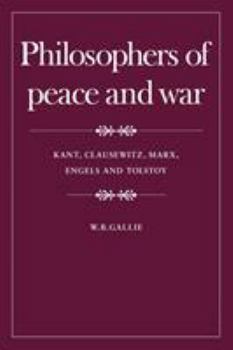Philosophers of Peace and War: Kant, Clausewitz, Marx, Engles and Tolstoy
(Part of the The Wiles Lectures Series)
Select Format
Select Condition 
Book Overview
Intellectual eminence apart, what did Kant, Clausewitz, Marx and Engels, and Tolstoy have in common? Professor Gallic argues that they made contributions to 'international theory' - to the... This description may be from another edition of this product.
Format:Paperback
Language:English
ISBN:052129651X
ISBN13:9780521296519
Release Date:September 1979
Publisher:Cambridge University Press
Length:160 Pages
Weight:0.70 lbs.
Dimensions:0.4" x 6.0" x 9.0"
Customer Reviews
1 rating
A Critique of Gallie's Critique
Published by Thriftbooks.com User , 16 years ago
In Philosophers of Peace and War author W.B. Gallie pursues the ambitious task of analyzing and critiquing the philosophical writings of Immanuel Kant, Carl von Clusewitz, Karl Marx, Friedrich Engels, and Leo Tolstoy as they relate to the human phenomena of peace and war. Published by the Cambridge Press in 1978, the book recounts a series of Wiles lectures Gallie delivered at the Queen's University of Belfast. Gallie claims to have chosen these influential thinkers not necessarily as representatives of a particular school of thought, or even as a progression of thinking on peace and war. Gallie states that these men represent a constellation of thinkers that can help illuminate our reflections and spur debate on the subject topic. He proceeds to examine from a philosophical perspective the seminal texts of each of these writers and pronounces all of them flawed in some way. Gallie holds up a yardstick - interestingly not the same for everyone - to the thinking of each of his authors and finds them wanting. Readers may find it somewhat ironic that Gallie also is fundamentally flawed in his methodology in the main and in particular instances as he seeks to twist the thinking of these authors for his own purpose. Immanuel Kant's Perpetual Peace receives both the highest praise and deepest criticism from Gallie. Perpetual Peace is a novelty among Kant's writings in that it is the first attempt amongst his prolific writings at political persuasion. The enduring quality of the work is that it proposes a law-governed relationship between states as a result of sovereign choice. Kant is credited with providing a notion that served as a philosophical precursor for the League of Nations. Despite this, Gallie pronounces Perpetual Peace, "a fantastic literary farrago". Kant is also criticized for writing about peace and war from strictly an 18th century European perspective. Gallie describes Kant's thinking as betraying important hesitations, inconsistencies, confusion, and ambiguities. Gallie goes on to portray Kant as a cloistered Prussian political voyeur, who passed on naive and priggishly obtuse political judgments. Despite these seemingly petty aspersions, Gallie freely admits Kant's examination of state relations vis-à-vis other states instead of internal dealings with citizens is entirely novel in the course of international relations. Although Gallie glosses over it, Kant's first principle deserves repeating: The recognition of the aim of perpetual peace between nations is a necessary first step in any assured progress toward a lawful international order. Carl von Clausewitz's On War receives an off-base assessment from Gallie. Although On War can rightly be termed a meditation on the dual nature of war, Gallie proceeds to address the work wholly as a philosophical exercise. Like many other expositors on "the Mahdi of Mass", Gallie presumes that in his reflections on Absolute war, Clausewitz is presenting not only a philosophica





